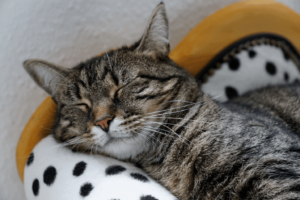When I was a student in college, I was living on a tight budget, and didn’t have the money to take my cat to the vet to get spayed.
You can probably guess what happened when she got outside at six months old! While I love kittens (is there anything cuter in this world?) I wasn’t prepared to take care of a litter of them.
So, lesson learned. I make sure to spay/neuter my cats. Did you know it’s also better for their health?
Anyway, if your cat is pregnant, you’re probably wondering what you can expect, and how you can help along the way.
Related: What age do cats go into heat?
Signs of a Cat Pregancy:
- Nipples become enlarged and red after two weeks of pregnancy.
- A pregnant cat will gain weight gradually over time (depending on the number of kittens). Expect 1-2 kilograms.
- Swelling or enlargement of the abdomen.
- Abdominal contraction (in later stages) and vaginal discharge.
- Behavioral changes into “maternal” mode such as purring frequently.
Here are the 7 stages of cat pregnancy:
1. Fertilization
Cats become sexually mature at six months of age; Oriental breeds can reach sexual maturity even earlier. Most experts recommend that cats get spayed as early as three months so they don’t go into heat. One litter of kittens can have multiple fathers, depending on how many tomcats mate with the queen.
You can recognize the signs of heat in your cat’s behavior. Your cat can become much more vocal; she may pace around the house meowing, and it can sound like she’s in distress (some people compare the sound to a baby crying). This is also known as, ‘calling’.
How You Can Help
Try not to let your cat go outside (they will be very quick to run to an open door). Give your cat plenty of affection, as they will be looking to you for comfort.
2. The Early Stage
Did you know that cats can experience morning sickness during this early stage of pregnancy? During the first two weeks, you may notice that you cat eats less and may even lose some weight.
This is due to the nausea and there is no need for alarm; by the third week your cat should be eating normally again and will start to gain a bit of weight. In the third week, you might be able to feel the bumps of the developing kittens.
How You Can Help
Give her love and attention if she wants it, but don’t be surprised if she is not as social in this stage. She may not exhibit normal behavior and will be less active than usual.
3. The Middle Stage
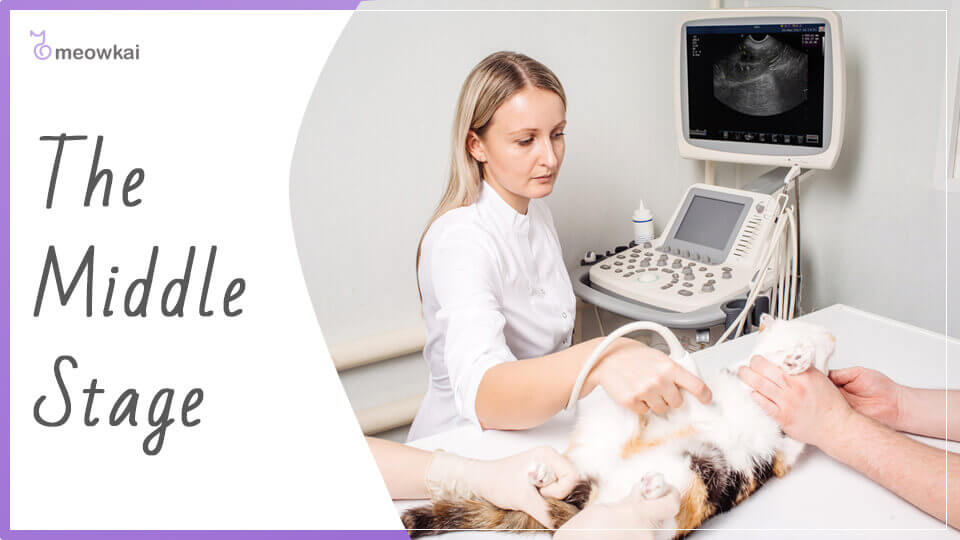
In this stage, you’ll notice your cat gaining weight at a steady, quick rate. The kittens are growing, and your cat will start to look like she swallowed a watermelon. If this is her first litter, she can be carrying anywhere from two to five kittens.
Subsequent litters are typically larger – about 5 to 7 kittens. Your cat will be lumbering around and be less active as she carries this extra weight around with her.
How You Can Help
Never give a pregnant cat cow’s milk. Water is best, but you can also give her milk that is formulated specifically for cats (Whiskas makes replacers, but you can ask your vet for their recommendation).
If you feed your cat a mixture of high-quality wet and dry food plus plenty of water, she should get all of the nutrients she needs to make milk when the time comes for her to feed her babies. You can also take your cat the vet at this stage to find out how many kittens she’s going to have and give her a check-up.
4. Pre-Labor
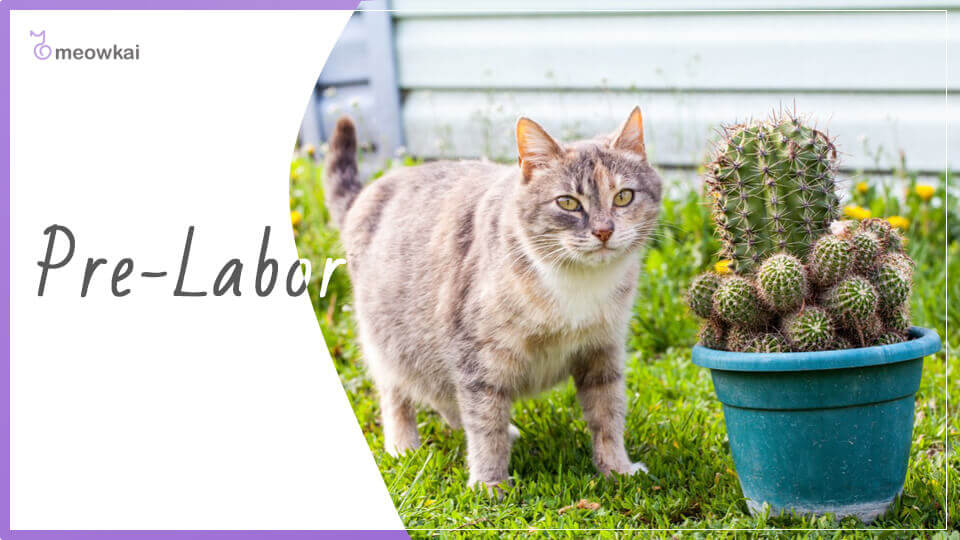
The pre-labor stage starts approximately one week BEFORE your cat births her kittens. At this stage, your cat’s nipples are clearly visible and they may be dripping milk at this point as well.
Your cat will start looking for warm, comfortable places so she can create a nest for her kittens. She may be restless and walk around the house. She may be less hungry at this stage and about two days before giving birth she may stop eating entirely.
How You Can Help
Give her as much attention as she desires but respect her privacy if she prefers it. She will need time and space to get her spot ready. You can place makeshift beds made up of old blankets in some of her favorite spots to help her choose where she wants to nest.
5. Labor And Delivery
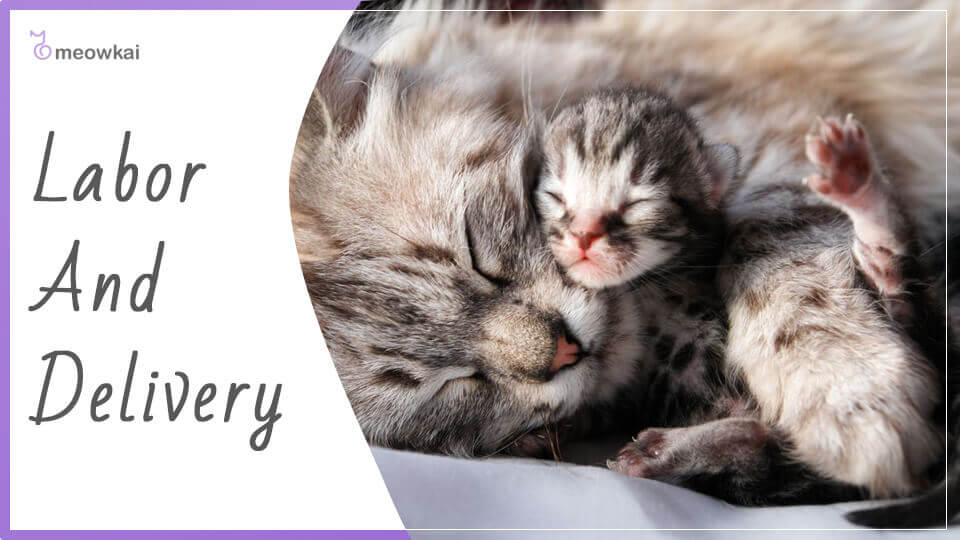
You will know when your cat goes into labor because she will show obvious signs. She will start licking her genitals and will likely make some noises of discomfort. She may pace around and act anxious if this is her first litter. She is likely to feel a bit frightened, not sure exactly what is happening or what to expect.
Her first kitten should arrive about an hour into the labor process. She will clean each of the kittens as they arrive; she will also eat the placentas. Although it will probably gross you out, let her eat them as they contain the extra nutrition she needs.
How You Can Help
There is no need to rush her to the vet. Let the process play out as nature intended. Watch over her and watch from afar, although you can talk to her soothingly and pet her gently as she gives birth. NEVER touch the kittens, no matter how cute you think they are (and truth be told, they’re not that cute as newborns)!
If your cat is showing obvious signs of discomfort, or it’s been more than five hours since the last kitten was delivered, and you know there are more, it’s time to call your vet.
6. After Delivery
Sparta giving birth to 6 kittens The kittens will need to stay with mom until they are weaned, usually at about eight weeks, but 12 weeks is even better. While they’re waiting to be weaned you can start to look for homes for them. Put up some online ads, or ask friends and family members (responsible ones) if they would like an addition. It’s up to you whether to charge for them or not. Free kittens will obviously go much quicker. Once you’ve found homes and they are old enough to leave mom, the new ‘parents’ can come and get them. These new cat guardians (humans never own cats don’t you know!) should take the kittens to the vet as soon as possible to make sure they are healthy. Many kittens are at risk for getting worms, which is not a major health issue, but should be taken care of immediately.
7. Life After Litters
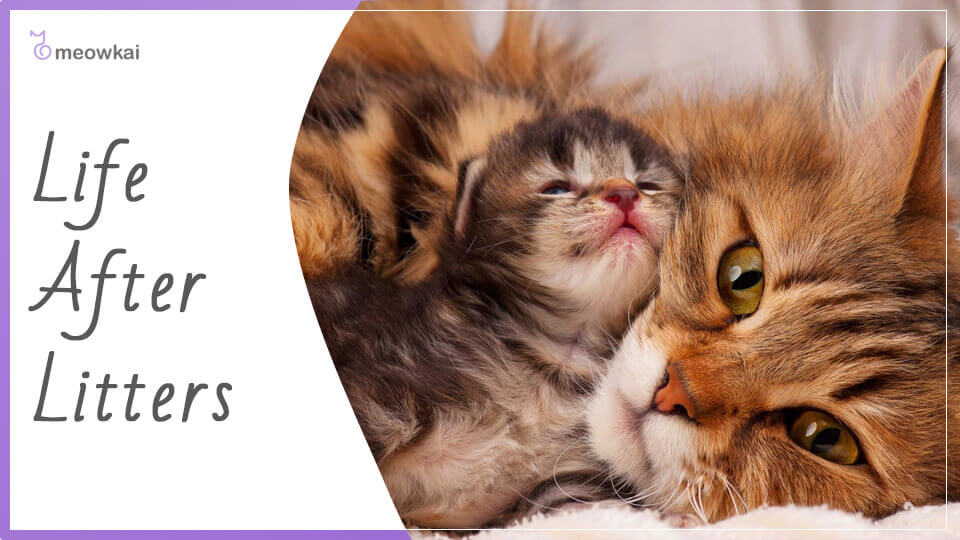
The entire process from fertilization to delivery takes about 67 days or about 9 weeks. Once the kittens have found homes, your cat will start to get back to her normal behavior. This is a good time to think about getting her spayed, so she DOESN’T have another litter.
I know I keep harping on this, but it really is best for your cat to be spayed or neutered. Not only does it help prevent illness and disease, it keeps unwanted pets out of shelters, or even worse, being dropped off at the side of the road in the middle of nowhere.
Cats may be much more independent than dogs, but they still require a lot of care and attention. Some people have a hard enough time taking care of themselves, never mind a pet! So keep this in mind when you’re trying to find the best homes for these kittens.
Once you know your cat is pregnant, and you know what to expect from each stage, you can be better prepared for what’s ahead, and you can help make your mom cat as comfortable as possible throughout the entire process.
Remember, there is generally no need to call your vet for assistance unless your cat shows obvious signs of trauma. Watch over her carefully throughout the labor process to make sure everything goes smoothly; otherwise, just let nature takes it course. Your cat will know what to do!
Related: When is a Bengal Cat Full Grown?
Frequently Asked Questions (FAQ))
Are There Cat Pregnancy Tests?
When cats are pregnant, there is a hormone called relaxin present in the bloodstream. While this test is not an over the counter product, your vet can provide a kit for home use.
What Are Cat Pregnancy Symptoms?
Symptoms of cat pregnancy include noticeable weight gain, swollen and pink nipples, enlarged abdomen, and behavioral changes such as frequent purring.
How Long Does A Cat Pregnancy Last?
A cat pregnancy lasts 58 to 67 days on average.
How To Prevent Cat Pregnancy?
The best way to prevent a cat pregnancy is to get your cat spayed or neutered. Monitoring your cat’s activity is another option to prevent mating.
How Long Does A Cat Stay in Heat?
The average time that a cat stays in heat is six days.
If you have any questions or would like to share your reviews on the how you help your pregnant cat, then comment down below. I would love to hear what you have to think.
- Sources:
- https://www.medicanimal.com/Understanding-the-signs-and-stages-of-pregnancy-and-advice-on-caring-for-your-pregnant-queen/a/ART111488
- https://www.freeportvet.com/services/cats/blog/pregnant-cat-care-tips


